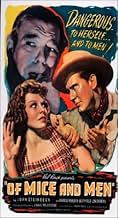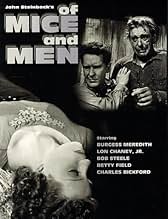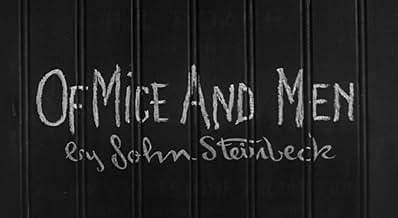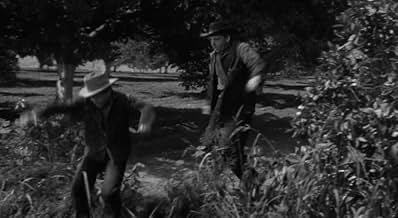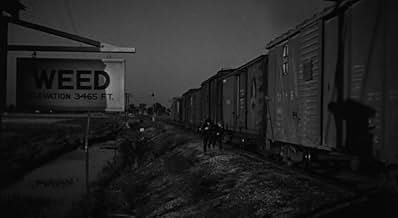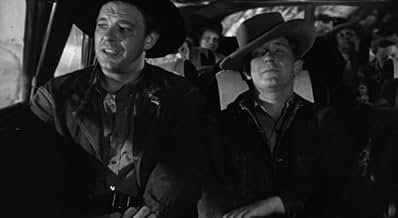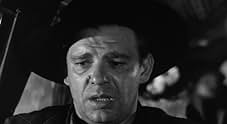CALIFICACIÓN DE IMDb
7.8/10
7.1 k
TU CALIFICACIÓN
Un gigante con discapacidad mental y su guardián sensato encuentran trabajo en un rancho de vaqueros sádicos en la era de la depresión en Estados Unidos.Un gigante con discapacidad mental y su guardián sensato encuentran trabajo en un rancho de vaqueros sádicos en la era de la depresión en Estados Unidos.Un gigante con discapacidad mental y su guardián sensato encuentran trabajo en un rancho de vaqueros sádicos en la era de la depresión en Estados Unidos.
- Nominado a 4 premios Óscar
- 2 premios ganados y 4 nominaciones en total
Henny Backus
- Girl
- (sin créditos)
Silver Tip Baker
- Old Hand
- (sin créditos)
John Beach
- Ranch Hand
- (sin créditos)
Baldwin Cooke
- Ranch Hand
- (sin créditos)
Whitney De Rahm
- Ranch Hand
- (sin créditos)
Eddie Dunn
- Bus Driver
- (sin créditos)
Jack Lawrence
- Ranch Hand
- (sin créditos)
Argumento
¿Sabías que…?
- TriviaOne of the first films to have a pre-credits opening sequence.
- ErroresAt the beginning, when George and Lennie are being chased, they are running alongside a train, then climbing inside. As they run, the shadow of the camera operator, wearing a cap, can be seen against a train car.
- Citas
George Milton: It ain't your fault, but look, if a fella steps on a round pebble and he falls down, breaks his neck, it ain't the pebble's fault, but the guy wouldn't a done it if the pebble hadn't been there.
- Créditos curiososThe movie begins before the credits are shown. George and Lennie are fleeing a mob. They board a moving freight train boxcar. As they close the door, we see the prologue as if written in chalk on the side of the boxcar. The words 'Of Mice and Men' then are highlighted, the rest of the words fade out, creating the opening title sequence with credits following, all written out.
- ConexionesFeatured in Brother Can You Spare a Dime (1975)
Opinión destacada
This screen adaptation of the John Steinbeck classic novel is a harsh, fantastic film that took the wind out of me with its frank and brutal depiction of desperation and longing. Movies about the Depression that were actually made at the time of the Depression by people who knew of what they spoke by necessity feel so much more authentic than later movies that treat the Depression as a historical event. The men in this film are quite literally living day to day, and the comparison of men to dogs that serves as a running motif throughout the film feels like more than just a poetic device. Like dogs, these men were faced with the scary prospect of some day being of no more use, and there was no system in place to take care of them when that day came. Being shot like a dog put out of its misery by its owner really was preferable to the alternatives awaiting them.
I was surprised about how candid this film was, and how bravely it tackled some of the thornier issues of Steinbeck's novel. The incident between Lenny and Mae is divested of some of its sexual overtones, but much is implied anyway. And a scene between Crooks, a black work hand, and some of the other workers, in which Crooks explains in blunt language what it means to be black, tackles race relations as honestly as many films today.
Moments of this film are almost unbearably sad and poignant, but never in that over-sentimental way common to Hollywood films of this time period. Burgess Meredith is terrific in the role of George; he expertly conveys--without ever directly addressing it--the bond he has with Lenny and the degree to which Lenny is as much George's savior as he is Lenny's. Charles Bickford is also excellent as a rough and world-weary worker. The cast's weak links are Betty Field--hopelessly overplaying her bored sex kitten--and Lon Chaney as Lenny, though both are very good in the pivotal scene that sets off the action of the film's finale.
John Ford's adaptation of "The Grapes of Wrath" from the following year gets all of the attention today, and one hardly ever hears of "Of Mice and Men." But much of what is great about Ford's film is also great about Lewis Milestone's, and he deserves credit for laying a fine blueprint for brining Steinbeck's beautiful and heartbreaking stories to the screen.
Grade: A
I was surprised about how candid this film was, and how bravely it tackled some of the thornier issues of Steinbeck's novel. The incident between Lenny and Mae is divested of some of its sexual overtones, but much is implied anyway. And a scene between Crooks, a black work hand, and some of the other workers, in which Crooks explains in blunt language what it means to be black, tackles race relations as honestly as many films today.
Moments of this film are almost unbearably sad and poignant, but never in that over-sentimental way common to Hollywood films of this time period. Burgess Meredith is terrific in the role of George; he expertly conveys--without ever directly addressing it--the bond he has with Lenny and the degree to which Lenny is as much George's savior as he is Lenny's. Charles Bickford is also excellent as a rough and world-weary worker. The cast's weak links are Betty Field--hopelessly overplaying her bored sex kitten--and Lon Chaney as Lenny, though both are very good in the pivotal scene that sets off the action of the film's finale.
John Ford's adaptation of "The Grapes of Wrath" from the following year gets all of the attention today, and one hardly ever hears of "Of Mice and Men." But much of what is great about Ford's film is also great about Lewis Milestone's, and he deserves credit for laying a fine blueprint for brining Steinbeck's beautiful and heartbreaking stories to the screen.
Grade: A
- evanston_dad
- 19 jun 2005
- Enlace permanente
Selecciones populares
Inicia sesión para calificar y agrega a la lista de videos para obtener recomendaciones personalizadas
Detalles
- Tiempo de ejecución1 hora 46 minutos
- Color
- Relación de aspecto
- 1.37 : 1
Contribuir a esta página
Sugiere una edición o agrega el contenido que falta

Principales brechas de datos
By what name was La fuerza bruta (1939) officially released in India in English?
Responda

